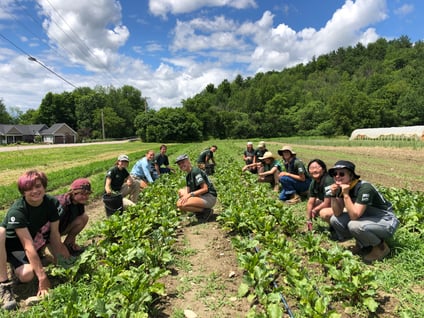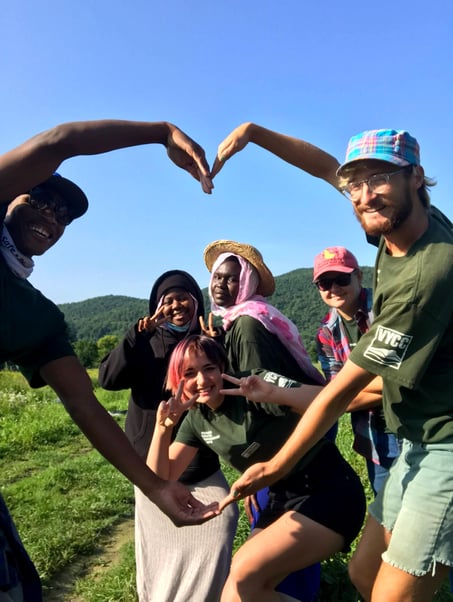Practical Activist Q&A Featuring: Susie Walsh Daloz, Vermont Youth Conservation Corps
- Bluestone Staff
- October 11, 2022
Susie Walsh Daloz is the Food and Farm Director at Vermont Youth Conservation Corps (VYCC). From The Food Project in Boston and The Edible Schoolyard in Berkeley to The Conservation Districts in Vermont, she has spent her career connecting people to their food, the land and the complexities of food systems. As the founding Director of UVM’s Farmer Training Program and working with New American farmer training programs around the country, Susie has thrived on supporting all aspiring farmers in building knowledge and skills for a career in sustainable agriculture. She loves the sight of steam rising from the compost pile, the taste of over-wintered spinach in early spring and the humbling feeling that there is always more to learn about farming.
Here are some highlights of our recent conversation with her:
Q: Where did your passion for food systems and agriculture begin?
A: I guess I should begin by telling you that I’m not from a farm family and I was born in Brooklyn, NY, and raised largely in suburb of New York City. I didn’t find my passion for farming and food until I got to college where I was in a food cooperative that was centered around the students doing every step of the process from organizing, cleaning, shopping and preparing meals for hundreds of people. This was captivating to me and opened up a series of questions about food I had never considered before. As part of the co-op, I was going to local farms to purchase produce. The more exposure I got to farming, the more enthralled I was with learning all there was to know about growing food.
In my early farming experiences like at the Food Project in Boston, I got to work not only with the land to grow food, but with youth and communities, looking at community access to food, and food justice. I got to see how people are connected to all the different stages of food and how communities intersect differently with food systems, and why and how food gets to some people and not others. As I started peeling back the layers and learning more, I was hooked.
Q: Tell us about the Health Care Share program and VYCC’s role in it?
 A: It’s the backbone of what we do here in the food and farm program and the “why” behind growing food on our farm. It provides meaningful context to the youth and young adults who engage in the daily work of farming 10 acres of vegetables. The Health Care Share Program is in its 10th year and VYCC started it in collaboration with Central Vermont Medical Center who was our first medical partner. It has evolved over the years, and right now, we have 10 medical center partners and 20 sites where we drop over 420 food shares on a weekly basis for 12-17 weeks. It is a public health initiative so the goal is to connect Vermont families who have barriers to accessing produce or a diet-related illness to locally and sustainably grown produce.
A: It’s the backbone of what we do here in the food and farm program and the “why” behind growing food on our farm. It provides meaningful context to the youth and young adults who engage in the daily work of farming 10 acres of vegetables. The Health Care Share Program is in its 10th year and VYCC started it in collaboration with Central Vermont Medical Center who was our first medical partner. It has evolved over the years, and right now, we have 10 medical center partners and 20 sites where we drop over 420 food shares on a weekly basis for 12-17 weeks. It is a public health initiative so the goal is to connect Vermont families who have barriers to accessing produce or a diet-related illness to locally and sustainably grown produce.
We partner with the Medical Centers and they identify the patients who could benefit from these healthy food shares. The VYCC food and farm crews do the work of growing, washing, packaging and delivering the food across the state. We also have a newsletter to educate people about what they’re getting and how to prepare the food. There’s even an online cooking class that members can access. We can all relate to getting fennel for the first time, and thinking: “What do I do with this?” This summer, some of our crew members went to pick up sites and did “taste tests” where they could share tips and tricks about recipes and food prep with members. That was a big hit.
Q: What does a day look like for the crew leaders working on the Food & Farm team?
 A: We start the day by “circling up” which helps our crews learn the tasks of the day and the context of those tasks. Then we do some stretching to get our bodies ready for some hard work. The tasks flow with the season. During the time our members are here, there’s a lot of transplanting, maintaining those crops (good old weeding!), then harvesting, washing and packaging the produce. We also have animals on the farm so that includes daily chores with our meat birds, laying hens and pigs. Also, one group every day spends time in our commercial kitchen, where they take produce from the farm and prepare lunch for all 60 people on the farm. It’s a great way to celebrate the daily work of growing food and sharing in the results of that work.
A: We start the day by “circling up” which helps our crews learn the tasks of the day and the context of those tasks. Then we do some stretching to get our bodies ready for some hard work. The tasks flow with the season. During the time our members are here, there’s a lot of transplanting, maintaining those crops (good old weeding!), then harvesting, washing and packaging the produce. We also have animals on the farm so that includes daily chores with our meat birds, laying hens and pigs. Also, one group every day spends time in our commercial kitchen, where they take produce from the farm and prepare lunch for all 60 people on the farm. It’s a great way to celebrate the daily work of growing food and sharing in the results of that work.
Q: As someone who works with youth every day, what are your hopes for future generations?
A: I see so much hope in our youth and a few things immediately come to mind for me. First, we underestimate their commitment to each other and their desire to have a positive impact on their communities. When they are working together on tangible tasks, I see the depth at which they are connecting to each other and their desire to build community.
The second thing I see is that they are teaching us a lot about mental health. This is not a small thing. Their ability to name, understand and engage proactively with what mental health looks like gives them tools that we didn’t have to navigate complex and stressful times. One last thing is that they’re actively engaged in questioning the gender binary and challenging the way that gender roles and expectations show up in our culture and systems. I see that as very healthy and very inspiring.
Q: Do you have a mantra or quote that you live by or that inspires you?.jpg?width=202&name=SusieWalshDaloz%20(2).jpg)
A: I do an annual theme which starts with a reflection process and then sets an intention for the new year. It feels more responsive to the moment for me and allows me to pivot if the theme is not serving me well. For 2022, my focus is on “Play.” Because when we are doing hard, important work, like engaging with inequities in our food system, that will take decades and generations of persistence, things can feel very serious. The pandemic was a heavy time, so I wanted to make sure that I am carving out time in my life for joy and play.
The Practical Activist blog is created by Bluestone Life. At Bluestone, our life insurance empowers our customers to protect family, community and planet by supporting nonprofits like VYCC. A Certified B Corp and a member of 1% for the Planet, Bluestone is a transformative choice for social, environmental and financial systems change.
Like hearing about Practical Activists?
We’ll share their stories with you monthly. (No email overload… we promise!)


